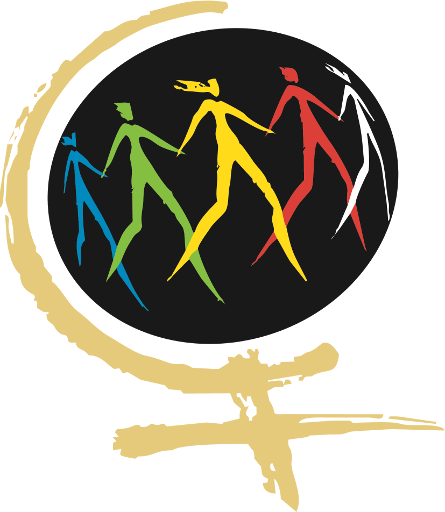At the end of March (March 29) about 35 women gathered in São Paulo, Brazil, for a round of conversation about feminist struggles around the world. The activity was organized by SOF – Sempreviva Organização Feminista and WMW militants.
In this opportunity the Brazilian militants received comrades from various parts of the world to share the challenges, struggles and achievements of women organized in the territories; as well as experiences of comrades from São Paulo in different contexts.
The international members of the WMW came from various parts of the world as South Africa, Tunisia, Ivory Coast, Nepal, Pakistan and Democratic Republic of Congo.
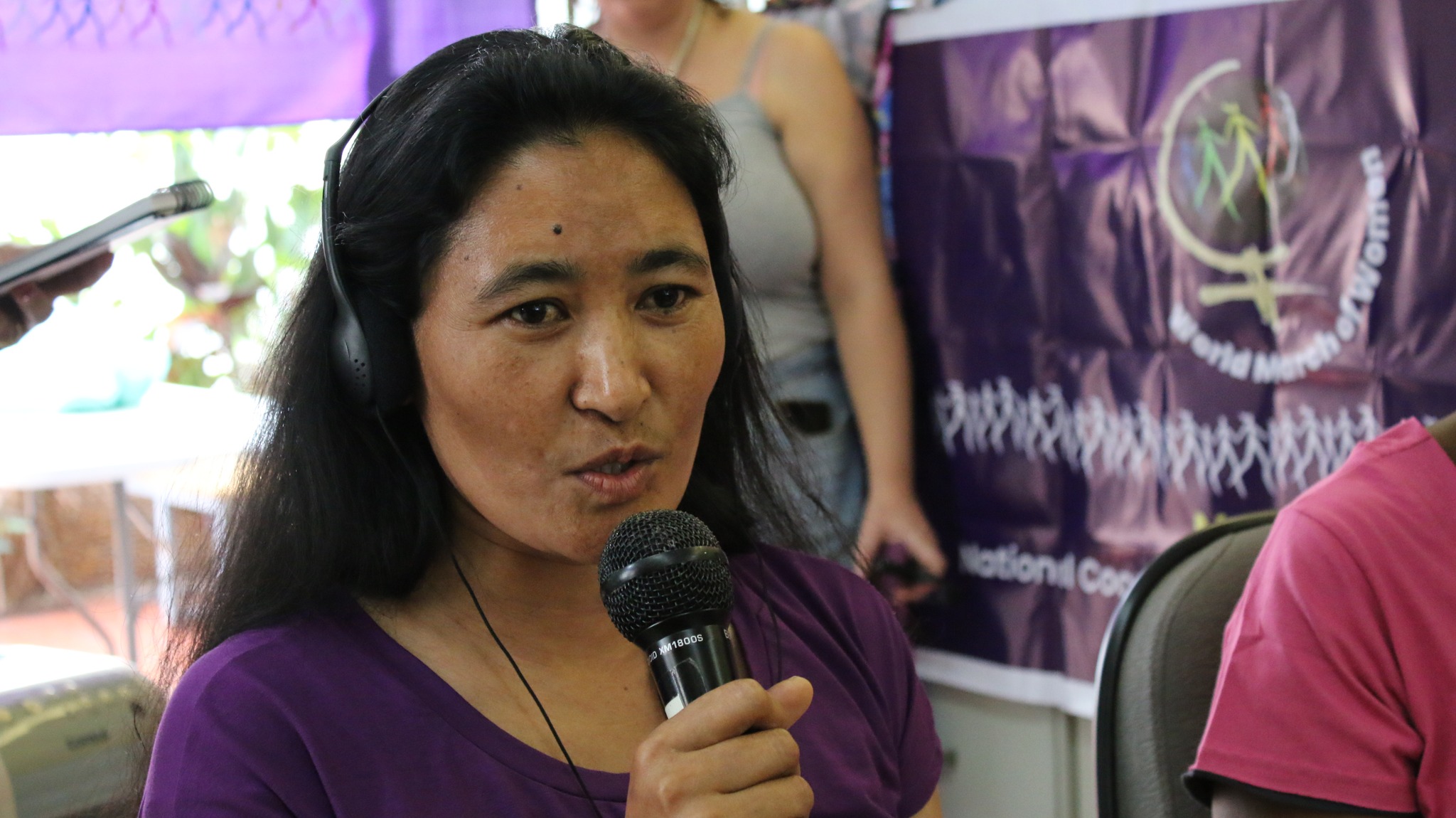

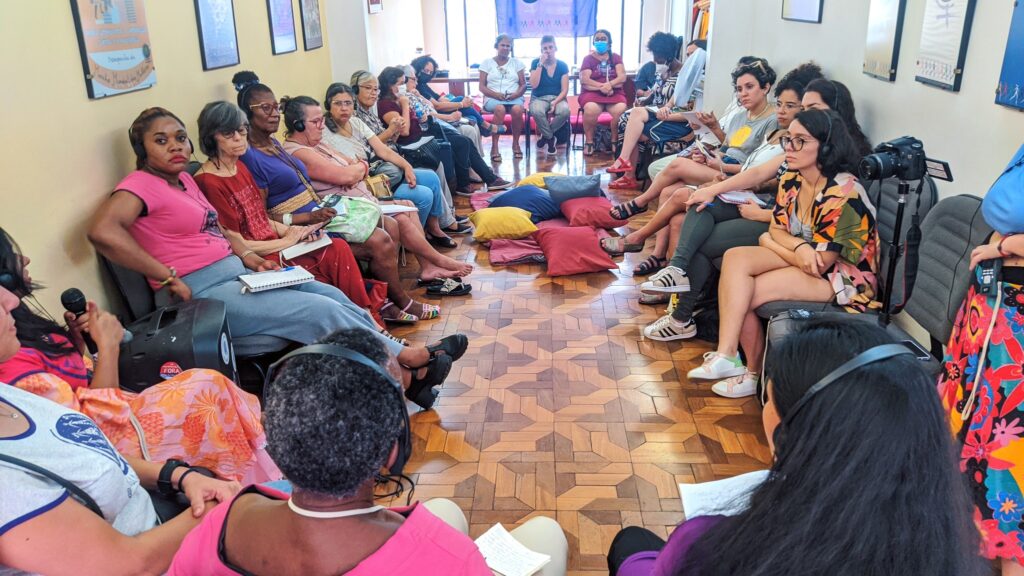
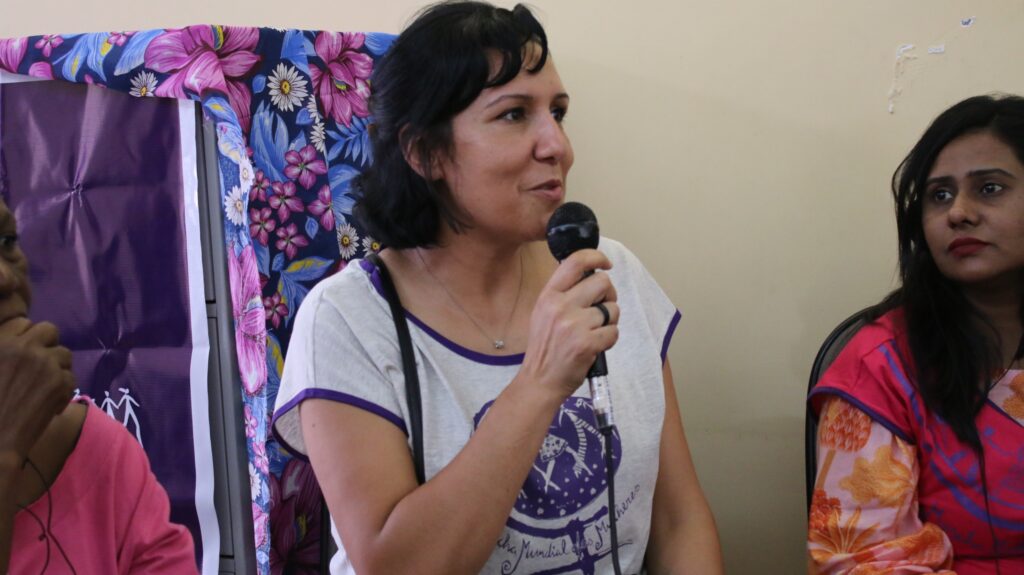
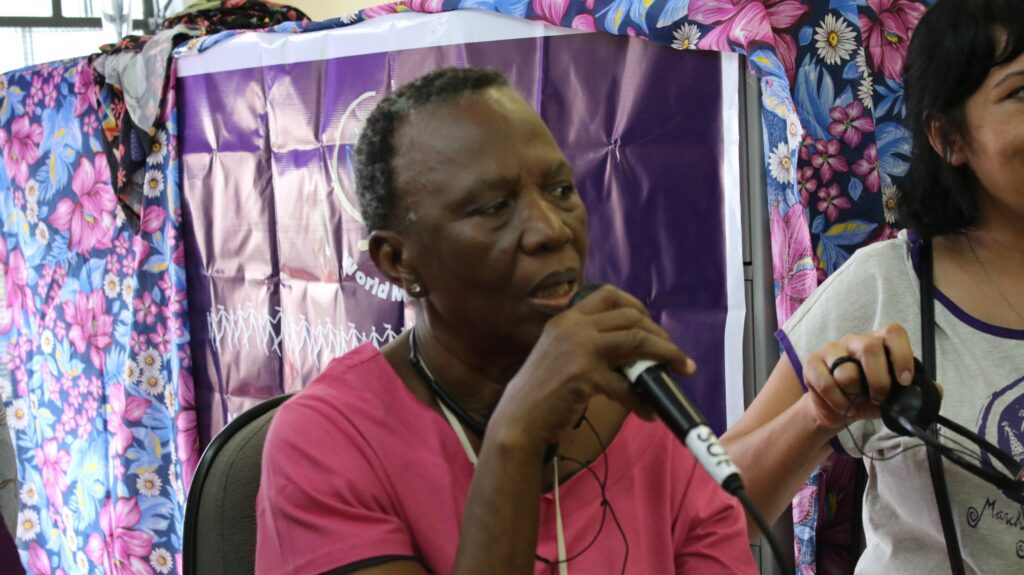
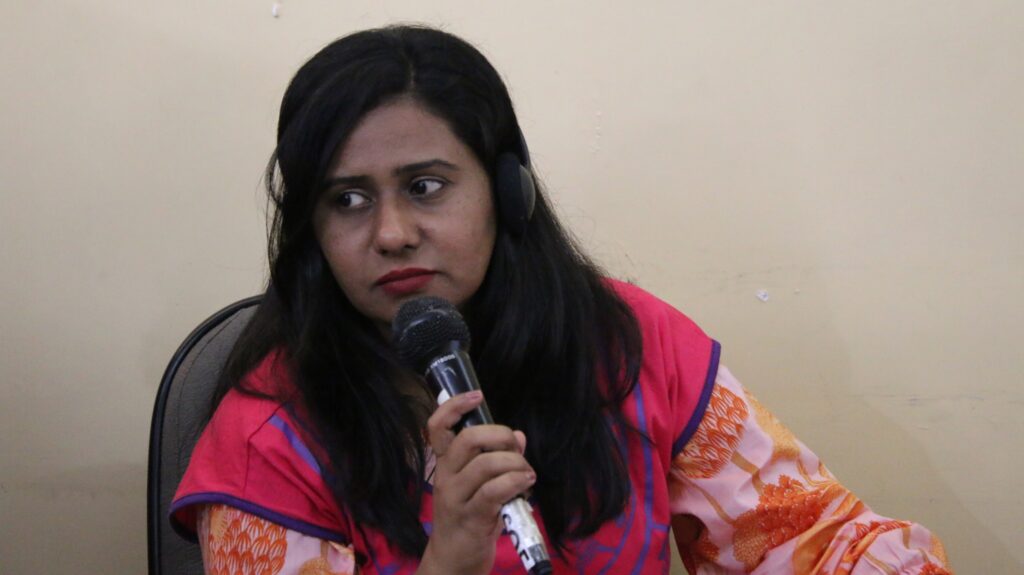
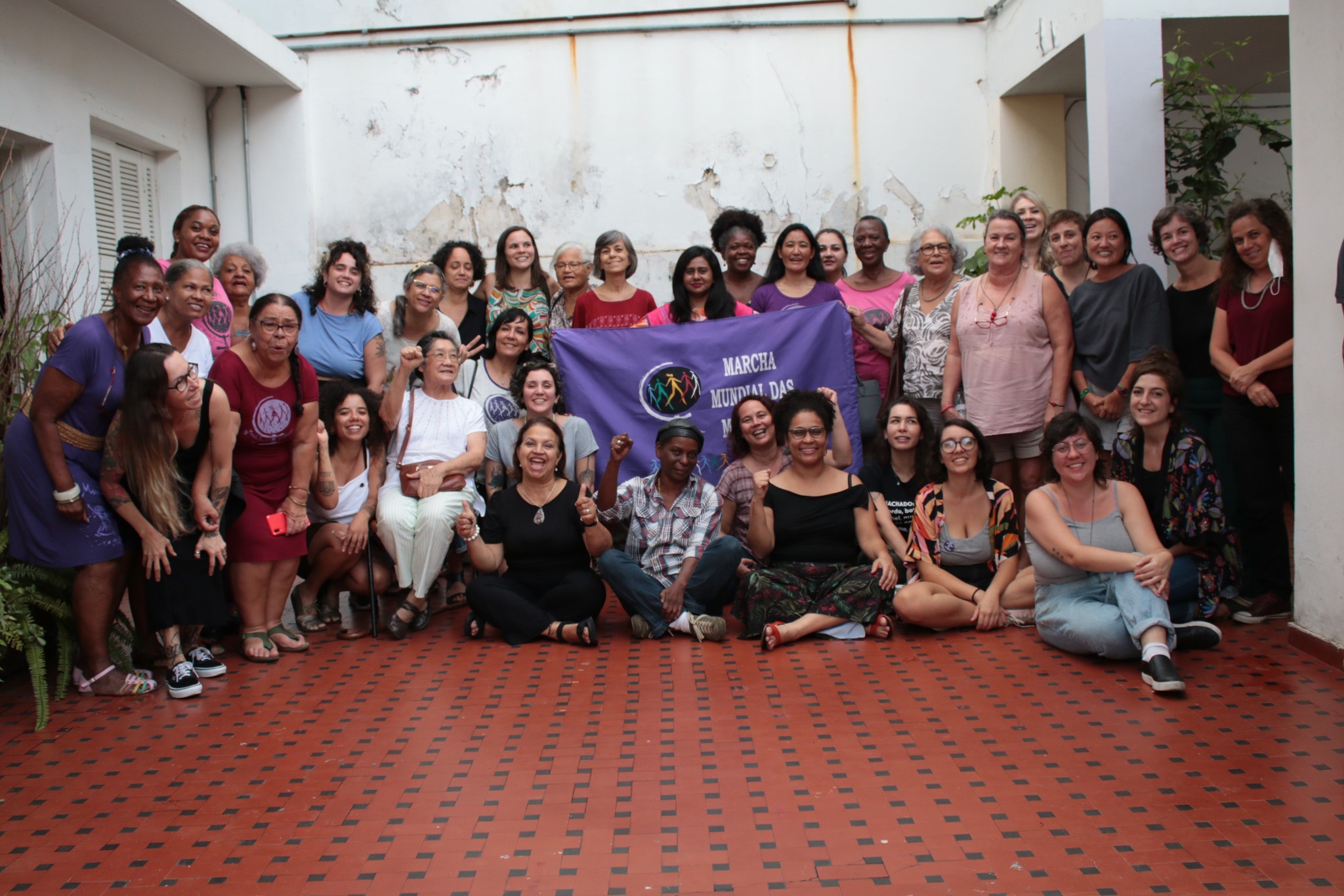
Below you can read the text that the Capire portal has just published with a synthesis of the reflections of the militants:
Internationalist Feminism: Women’s Many Struggles Around the World
WMW militants in Africa and Asia reflect on the construction of feminism in their countries
Over the almost 25 years of existence and action of the World March of Women, the movement has developed a characteristic that makes it international and internationalist: the active relationship among women from several countries around the world who, together and from their distinct realities, organize to build a new world. During this time, the international coordination of the March has had headquarters in Quebec, Brazil, Mozambique, and now it is in Turkey.
Despite cultural and political particularities of each region, the March organizes common agendas, getting stronger as from both similarities and differences. This text was compiled with speeches of African and Asian militants Kaouther Abbes, Solange Kone, Daya Laxmi Shrestha, Asma Aamir, and Deodate Bisomerine during an activity organized in March 2023, in São Paulo, Brazil.
The construction of the World March of Women boosted the international organization of grassroots feminism. Women show in their actions how they feel stronger by knowing that, while they struggle in their territories, other comrades struggle around the world, too. International solidarity and internationalism have this power: understanding that the joint struggle brings about transformation, creates a world with no capitalism, patriarchy, and racism.
Solange Koné, a militant in the Ivory Coast and member of the International Committee, talks about issues common to almost all regions in Africa, such as authoritarianism, economic dependence, wars and conflicts, and the conservative trends that restrict and subordinate women. “If we think of Africa, with its mineral and petroliferous resources, what do we lack? Almost nothing! But why, in view of all these natural possibilities we have, are we the poorest continent?”, Solange questions.
According to Solange, women’s situation in the continent is hard because they are still victims of forced marriages, they are used as bargaining chip between armed groups, and, on the political level, they still have a lot of work ahead to get basic rights. “We, African women, are still not sufficiently aware of our strength. And, most of all, of what our unity may achieve”.
Training
Building feminism in the continent is what guarantees women’s advancements and achievements. For that, being connected to the antisystemic feminism of other regions around the world represents a possibility of exchanging perspectives and methods of struggle and training new feminists. The School of Facilitators, of international scope, is an example of that.
In South Africa, women of the March propose training programs in alliance with the Development Action Group, which works to organize and strengthen communities in the country. “So many of our staff are young people trying to change things in South Africa. Pushing the government to change policies, and push actions that support informal settlements”, Kaouther Abbes, a WMW militant in the country, explains.
Militant Kaouther’s work also includes facilitating communication of refugees from the francophone region of Africa in the country, as well as educational works for children who cannot go to school yet due to lack of documentation. The militant lives in Bloemfontein, one of the first cities in the country to establish the Apartheid regime. With a history of segregation and racism, still present to this day, movements in South Africa have the challenge of denouncing discrimination against the diversity of people of many colors and cultures, born in the country or foreign immigrants, who live or transit there.
In Pakistan, the World March of Women articulates as from organization Women in Struggle for Empowerment – Wise. One of the purposes of the organization is training young militants to build movements and leadership. “The WMW and Wise in Pakistan are working and trying hard to encourage and promote leadership in movement building. We want to provide opportunity to young women through feminist schools, and connecting them to each other. We work on subjects like imperialism and colonization, what is feminism, and we discuss sexuality”, Asma Aamir, a WMW militant and member of Wise, explains.
Training experiences have also guided organization of women in the Democratic Republic of the Congo (DRC). In 2010, the country hosted the closing of the 3rd International Action of the March. In the country, more specifically in its capital, Bukavu, the presence of armed groups threatens women’s safety and life, as they are the main victims of local conflicts.
Justice and Peace
Women in these conflict zones are susceptible to the most diverse sexual crimes, thus being forced to move away from their territories. Displacement exposes women to precariousness and makes access to health care and even food difficult. One the struggles of the feminist movement in the Democratic Republic of the Congo is the struggle for justice and medical assistance for women victims of violence.
For Deodate Bisomerine, lawyer and a WMW militant in the country, justice advancements are an achievement of the feminist movement: “These ten years are a victory from the legal point of view, but we also need to work on the subtleties of this law. There is still much work to do to guarantee that this law is implemented”, Deodate states. Deodate still sees many challenges for rural women in the struggle for justice. Without guarantee of access to land, actions of armed groups and usurpation of land by transnational corporations also threaten lives in the countryside. “In Africa, legal proceedings are usually lengthy and expensive, and women’s economic power is weak, which prevent them from having access to justice. Within the World March, we notice that a kind of network of lawyers has been organizing to guarantee justice for women”, Deodate explains.
Against Fundamentalism and Antifeminism
In Pakistan, even using the word feminism is a risk. Asma tells us that, currently, “there is a lot of political conflict and instability. The local government is not present. In this scenario, working for women rights becomes more difficult. Besides, the word ‘feminism’ is enough for us to be in danger. People don’t use this word. For us, in the organization, to use this word, we suffer consequences”. Violence may be individual, through threats and actions against militants, but also institutional, by forbidding feminist demonstrations or preventing resources from reaching organizations, even though these are constitutional rights.
“Our findings have shown that in our country women defenders suffer death threats, cyber harassment, rape, and even public and verbal threats from powerful people”, Asma says, based on a study currently developed by Wise. Despite all such risks, on this March 8, 2023, many young militants went to the streets. They wore masks to avoid being recognized by society, by their families, and by religious fundamentalists.
“When it comes to feminism, we face similar problems as other countries”, Kaouther says, showing the similarities between women’s challenges, even in different continents. In South Africa, “the lives of women are very limited by a religious and old customs background. We have a high number of women representation in the parliament, but still we are fighting for more space”, she says.
African countries suffer with a massive invasion of Pentecostal churches that affect women’s lives on streets and inside their homes. Based on a patriarchal conservatism, these churches still portray traditional religions as condemnable practices. Solange denounces how church ministers make a fortune with the faithful’s contributions and exercise a role of control over women’s lives, even getting to choose to whom they marry. “These ministers took their money, making a fortune at the expense of the population. Women get married without any reason. There has been a big setback with this invasion, and I always ask myself what our authorities are doing to allow this to happen. While we think of political decolonization, there has been a religious colonization, as it happened in the past”. To Solange, it is important to remember that the process of colonization of Africa started with imposition of a religion, and that, nowadays, this scenario establishes once again as from a new order of control.
In Nepal, South Asia, organized women have also been key in the struggle against authoritarian regimes. Until 2008, the country was a monarchy, in a relation of historical submission to Great Britain. In May that year, a Constituent Assembly was created to abolish monarchy, establishing the Federal Democratic Republic of Nepal. Although the new Constitution has brought advancements in terms of rights and political participation for women and for the working class, the implementation of these rights is not guaranteed yet.
“The patriarchy system is very cultural and strong in Nepal. Women suffer from domestic and other forms of violence. What we try to do is to work on the national and local level on a woman alliance, on the government, and on civil society organizations, to make women stronger. There are so many women’s rights militants now, and also an increasing women participation on the government”, Daya Laxmi says about women’s organization in the country.
Struggling for Autonomy and Transformation
Conservatism’s role in controlling women’s bodies and sexuality has similar effects in many countries. Through organization and feminism, these women propose irreverent and transformative ways of struggling for their autonomy.
In Pakistan, even in view of the challenge of finding other words and ways of expressing their claims, women defend a campaign for the right over their own bodies under the well-known slogan “my body, my rules”. “This is a conflictive slogan, but we use it to go against society and the religious. Women are asking for their body rights and their freedom”, Asma explains. To protect themselves from persecution, women use social media with caution, always trying to protect sensitive information and using more inclusive language. The collectivity on the streets allows women to express themselves more freely. “On the streets we provide a space for us on the media, and we can portray our image positively to bring acceptance of the march on society”, she completes.
Political participation is a women’s claim to fight poverty, strengthening economic autonomy. Daya talks about struggles in Nepal: “We do capacity building trainings every year on the social, economic, and political sector. We want to empower women; we do this to have them in the decision-making places. And we are getting there with more and more women participating on the public and political life, especially on local level bodies”.
